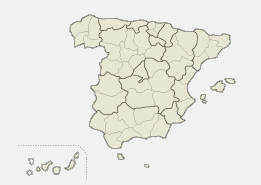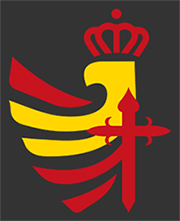- Home
- International Missions
- Somalia
- EUTM SOMALIA (European Union Training Mission in Somalia)
EUTM SOMALIA (EUROPEAN UNION TRAINING MISSION IN SOMALIA)
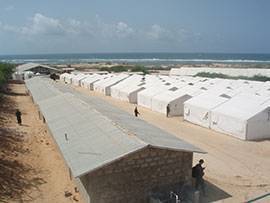
View of the facilities in the Jazeera Training Camp in Mogadishu
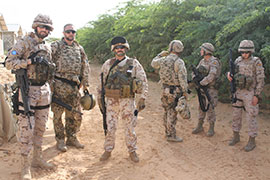
EU military instructors and mentors at the Jazeera Training Camp
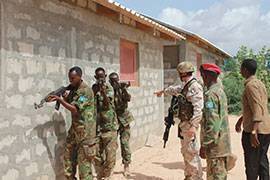
Training exercises at the Jazeera Training Camp
Background
Somalia has been embroiled in civil war since the early 1990s, which has left the country without public administrations or strong government structures. In fact, it has become the epitome of a failed state.
In order to stabilise the region and help solve the conflict in Somalia, the UN mediated the 2008 Djibouti Agreement, signed by representatives of the Transitional Federal Government and of the Alliance for the Re-liberation of Somalia. The agreement, which was endorsed by other countries and international organisations acting as observers, committed both parties to put an end to the conflict and undertake confidence-building measures.
The United Nations acknowledged the situation of instability in Somalia with Security Council Resolution 1872 (2009), in which it also emphasised the need to strengthen the Somali security services by improving their training and equipment so as to promote security and stability in the country. It consequently urged the international community to provide technical assistance to the Somali Security Forces.
The Council of the European Union decided to respond to this call and contribute to the international efforts to promote peace and development in Somalia. Spain intended to play a leading role in the fight against piracy and offered to lead the EU mission during the meeting of ministers of Defence which took place in Brussels in 17 November 2009. On 26 January 2010 the EU Foreign Affairs Council agreed to set up a military mission to contribute to the training of the Somali security forces and the implementation of the Djibouti Agreement. Following the provisions of that document, Council Decision 2010/96/CFSP was adopted on 15 February 2010 foreseeing the establishment of the European Union Training Mission in Somalia (EUTM Somalia).
Development of the Mission
The aim of EUTM Somalia, which is essentially of a training nature, is to strengthen the Somali Federal Government and its institutions. From 2010 until the first quarter of 2014 the mission contributed to the training of around 3,600 Somali soldiers, mostly with courses for NCOs, specialists and instructors.
Over its first two mandates (Decision 2010/96/CFSP of 15 February 2010 and Decision 2011/483/CFSP of 28 July 2011), EUTM Somalia focused on offering specialised training in Bihanga (Uganda). Given the success of the mission and the wide consensus in the international community that its mandate should be extended, on 22 January 2013 the Council decided to prolong it until 31 March 2015.
The new mandate introduced a significant change because it envisaged that the mission would be gradually transferred from Uganda to Somalia. Furthermore, mentors and advisors were added to the personnel engaged in training in order to provide further support to the Somali authorities in the domains of security and defence. On 20 December 2013 the activities at the Bihanga Training Camp were brought to a close and the EUTM HQ at Kampala (Uganda) was relocated to the facilities at Mogadishu airport. Training activities were transferred to the Jazeera Training Camp near the airport.
The mission is being coordinated with other significant actors in the area such as the United Nations and the African Union – specifically its operation for Somalia: AMISOM (African Union Mission in Somalia).
The third mandate of the mission is being executed by some 125 troops from twelve EU countries plus Serbia. Eleven are Spaniards – nine in Mogadishu and one each in Nairobi and Brussels. However, the number of personnel making up the training teams varies depending on the courses being taught.
ARMY UNITS
- Araba Álava |
- Albacete |
- Alicante |
- Almería |
- Asturias |
- Ávila |
- Badajoz |
- Barcelona |
- Burgos |
- Cáceres |
- Cádiz |
- Cantabria |
- Castellón |
- Ceuta |
- Ciudad Real |
- Córdoba |
- A Coruña |
- Cuenca |
- Girona |
- Granada |
- Guadalajara |
- Gipuzkoa |
- Huelva |
- Huesca |
- Islas Baleares |
- Jaén |
- León |
- Lleida |
- Lugo |
- Madrid |
- Málaga |
- Melilla |
- Murcia |
- Navarra |
- Ourense |
- Palencia |
- Las Palmas |
- Pontevedra |
- La Rioja |
- Salamanca |
- Segovia |
- Sevilla |
- Soria |
- Tarragona |
- Santa Cruz de Tenerife |
- Teruel |
- Toledo |
- Valencia |
- Valladolid |
- Bizkaia |
- Zamora |
- Zaragoza
